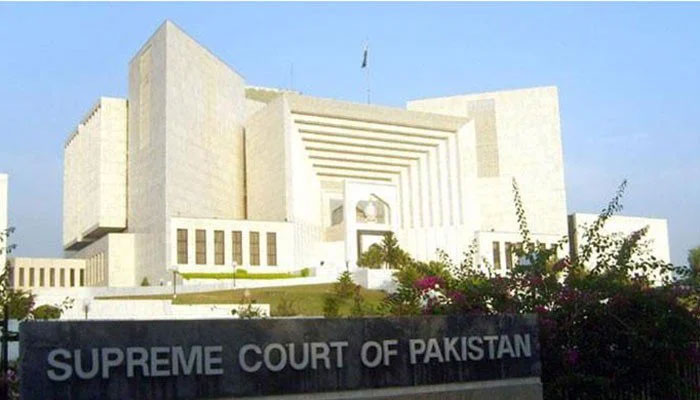Allotment of plots SC questions discretionary powers of PM
ISLAMABAD: The Supreme Court, while questioning the discretionary powers of the prime minister to allot two plots to government officials, has observed that there is no principle involved, as the haves are facilitated while the have-nots are neglected.
This was observed by a two-member bench of the apex court, headed by Justice Qazi Faez Isa, on Thursday while hearing the case of the Federal Government Employees Housing Foundation on allotment of plots.
The court dismissed the appeal of appellant Muhammad Siddique and upheld cancellation of allotment of the second plot. During the hearing, Justice Qazi Faez Isa observed that the prime minister, while exercising his discretionary powers, had allotted two plots, adding that there is no principle for allotment of plots in the country as we read in newspapers about allotment of two plots to federal secretaries.
The judge observed that in our country only the big guns managed to get plots but nobody allots plots to the poor. Justice Isa questioned if the secretaries and generals don’t draw salaries.
"Go to the slums and witness the living standard of the poor having small rooms," Justice Isa remarked. The judge further observed that although the country's name was Islami Jamhuria Pakistan, nothing was being done here in accordance with Islam.
To a court query, the counsel for the Federal Government Employees Housing Foundation submitted that the policy of allotment had been abolished, adding that earlier two plots were allotted to bureaucrats and other officials of state institutions.
The counsel further said after 2006, nobody had got two plots. The counsel for appellant Muhammad Siddique pleaded the court to set aside the decision of cancellation of the second plot because his client had constructed a house on the plot, which was being taken over now. The court, however, rejected the plea of the counsel.
-
 Andy Cohen Gets Emotional As He Addresses Mary Cosby's Devastating Personal Loss
Andy Cohen Gets Emotional As He Addresses Mary Cosby's Devastating Personal Loss -
 Andrew Feeling 'betrayed' By King Charles, Delivers Stark Warning
Andrew Feeling 'betrayed' By King Charles, Delivers Stark Warning -
 Andrew Mountbatten's Accuser Comes Up As Hillary Clinton Asked About Daughter's Wedding
Andrew Mountbatten's Accuser Comes Up As Hillary Clinton Asked About Daughter's Wedding -
 US Military Accidentally Shoots Down Border Protection Drone With High-energy Laser Near Mexico Border
US Military Accidentally Shoots Down Border Protection Drone With High-energy Laser Near Mexico Border -
 'Bridgerton' Season 4 Lead Yerin Ha Details Painful Skin Condition From Filming Steamy Scene
'Bridgerton' Season 4 Lead Yerin Ha Details Painful Skin Condition From Filming Steamy Scene -
 Matt Zukowski Reveals What He's Looking For In Life Partner After Divorce
Matt Zukowski Reveals What He's Looking For In Life Partner After Divorce -
 Savannah Guthrie All Set To Make 'bravest Move Of All'
Savannah Guthrie All Set To Make 'bravest Move Of All' -
 Meghan Markle, Prince Harry Share Details Of Their Meeting With Royals
Meghan Markle, Prince Harry Share Details Of Their Meeting With Royals -
 Hillary Clinton's Photo With Jeffrey Epstein, Jay-Z And Diddy Fact-checked
Hillary Clinton's Photo With Jeffrey Epstein, Jay-Z And Diddy Fact-checked -
 Netflix, Paramount Shares Surge Following Resolution Of Warner Bros Bidding War
Netflix, Paramount Shares Surge Following Resolution Of Warner Bros Bidding War -
 Bling Empire's Most Beloved Couple Parts Ways Months After Announcing Engagement
Bling Empire's Most Beloved Couple Parts Ways Months After Announcing Engagement -
 China-Canada Trade Breakthrough: Beijing Eases Agriculture Tariffs After Mark Carney Visit
China-Canada Trade Breakthrough: Beijing Eases Agriculture Tariffs After Mark Carney Visit -
 Police Arrest A Man Outside Nancy Guthrie’s Residence As New Terrifying Video Emerges
Police Arrest A Man Outside Nancy Guthrie’s Residence As New Terrifying Video Emerges -
 London To Host OpenAI’s Biggest International AI Research Hub
London To Host OpenAI’s Biggest International AI Research Hub -
 Elon Musk Slams Anthropic As ‘hater Of Western Civilization’ Over Pentagon AI Military Snub
Elon Musk Slams Anthropic As ‘hater Of Western Civilization’ Over Pentagon AI Military Snub -
 Walmart Chief Warns US Risks Falling Behind China In AI Training
Walmart Chief Warns US Risks Falling Behind China In AI Training




